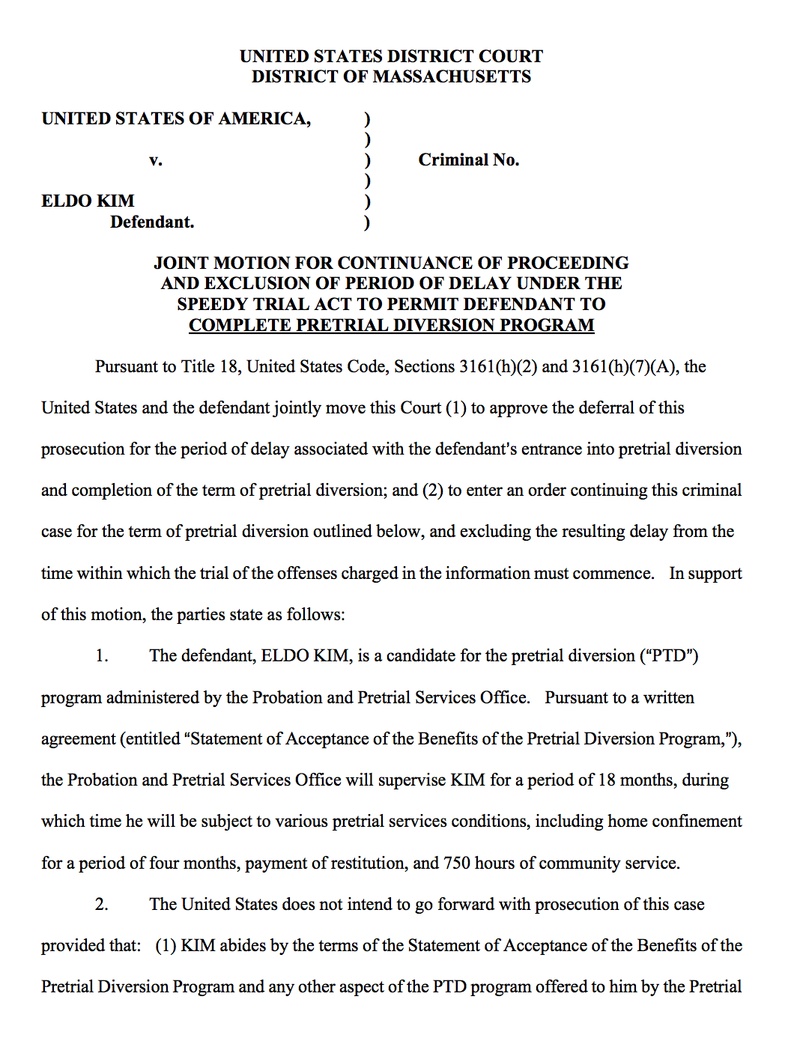
News
Harvard Grad Union Agrees To Bargain Without Ground Rules

News
Harvard Chabad Petitions to Change City Zoning Laws

News
Kestenbaum Files Opposition to Harvard’s Request for Documents

News
Harvard Agrees to a 1-Year $6 Million PILOT Agreement With the City of Cambridge

News
HUA Election Will Feature No Referenda or Survey Questions
Eldo Kim Charged in Bomb Threat Case, Unlikely To Get Jail Time
UPDATED: October 10, 2014, at 9:42 p.m.
Eldo Kim, the Harvard College sophomore who allegedly threatened to bomb four campus buildings last December, was charged Friday with emailing bomb threats to the Harvard University Police Department, The Harvard Crimson, and two Harvard officials.
The U.S. Attorney asked Friday that the court defer prosecuting Kim for 18 months, while he takes part in a pretrial diversion program. Under the diversionary agreement, Kim will be confined to his home for four months, will have to complete 750 hours of community service, and will have to pay restitution to the law enforcement agencies active in responding to his bomb threats.

The agreement also stipulates that Kim will have to make a public apology.
The Probation Department and Pretrial Services Office will oversee Kim’s diversion program.
If the court signs off on the agreement and Kim meets its terms, the U.S. Attorney’s Office said that it plans to dismiss all charges. If Kim does not, the office will initiate criminal prosecution.
Kim, 21, was previously charged by complaint in December; he has been under supervision since then, pending a trial.
Allison D. Burroughs, Kim’s lawyer, wrote in an email Friday evening that Kim was “relieved” at not having to face felony conviction, and that he is “fully prepared” to meet the requirements of the agreement.
Burroughs added that Kim was “deeply remorseful” about what he had done and grateful that the U.S. Attorney’s Office “was willing to distinguish between a terrorist and a bright, sleep deprived kid under difficult personal circumstances who made a very poor decision.”

Kim did not appear in court Friday, according to Burroughs.
Kim allegedly sent his threats half an hour before he was scheduled to take a final exam at 9:00 a.m. on Dec. 16, 2013, according to a press release from U.S. Attorney Carmen M. Ortiz’s office. The threats provoked a massive response from local, state, and federal authorities, as well as the evacuation of the Science Center, Emerson, Sever, and Thayer halls, the closure of Harvard Yard, and the cancellation of several exams.
The closures lasted for roughly five hours as HUPD, Cambridge Police, and federal law enforcement searched campus, clearing the four threatened buildings one by one. Several noon exams were also postponed or cancelled. Many students made up the affected exams in February.
Kim’s threats were sent using Guerrilla Mail, a free application that generates temporary anonymous email addresses, according to an affidavit filed in December. Kim also used a free application called TOR, which generates a random anonymous IP address for temporary use that is difficult for law enforcement to trace.
The affidavit aid law enforcement authorities determined that Kim had accessed TOR on the Harvard network before the email was sent.
Assistant U.S. Attorney John A. Capin represented the prosecution in the case.
—Staff writers John P. Finnegan, Noah J. Delwiche, Theodore R. Delwiche contributed to the reporting of this story.
Want to keep up with breaking news? Subscribe to our email newsletter.
Most Read
- Harvard’s Hyperfixation on Israel Is Academically Unserious
- Harvard Police Union Overwhelmingly Votes No Confidence in HUPD Chief Clay
- Trump Administration Conditions Harvard’s Funding on Eliminating DEI, Restricting Protests
- Facing Trump’s Ultimatum, Harvard Has No Easy Choices
- House Door Boxes Elicit Backlash Over Conservative Student Publication
